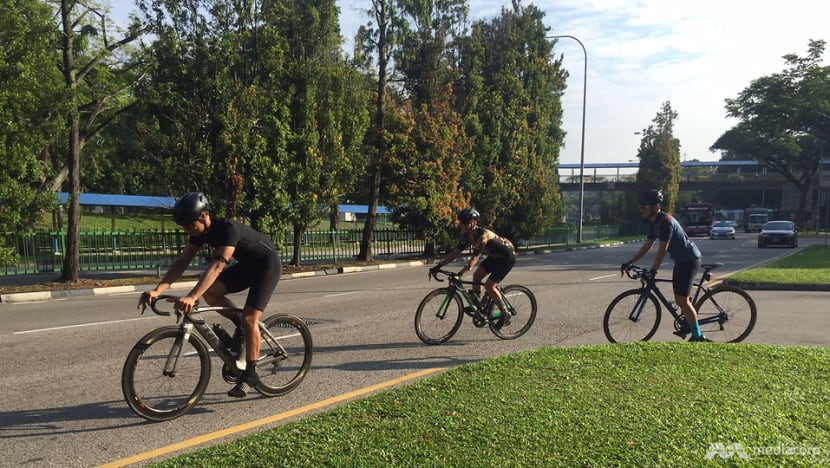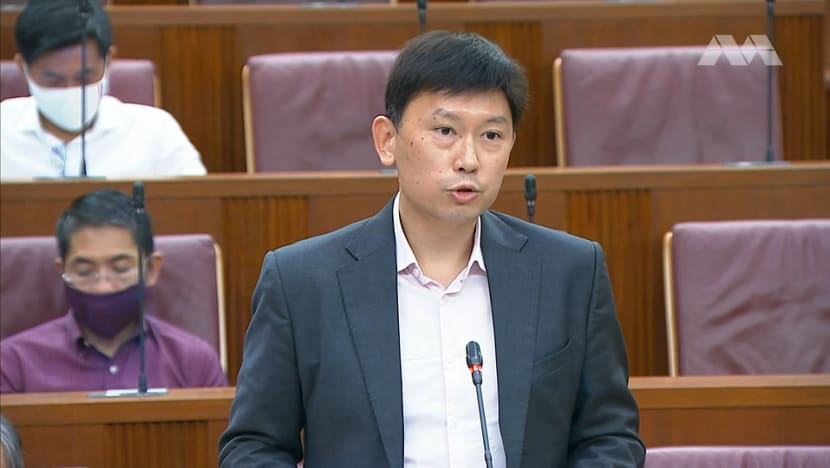Review on whether cyclists must ride in single file on roads, limits on cycling group sizes: Chee Hong Tat

Cyclists in Singapore. (Photo: Yeo Kai Ting)
SINGAPORE: As part of its review of the rules surrounding cycling on roads, the Active Mobility Advisory Panel (AMAP) is considering whether cyclists should be made to ride in a single file, said Senior Minister of State for Transport Chee Hong Tat.
Speaking in Parliament on Tuesday (May 11), Mr Chee reiterated that the panel - formed in 2015 to propose rules on the use of bicycles and personal mobility devices (PMD) in public - is conducting a review of whether safety rules need to be strengthened and if existing penalties need to be increased.
“For example, it is studying suggestions from the public on whether cyclists should be required to ride in a single file at all times on the roads, and if there should be limits on group sizes for on-road cycling,” he said.
Mr Chee noted current rules allow for cyclists to ride two abreast in the leftmost lane of a multi-lane road, and only require them to stay in a single file if riding on a road with a single lane, to prevent obstruction to traffic.
“There are some ongoing discussions with different groups of stakeholders on whether this is a good practice or not,” he added.
One point of view is that this enhances safety for cyclists, as a “reasonably sized group” would encourage motorists to pay more attention to them and be more aware of their presence on the roads, he said.
READ: Panel to review rules on cycling on the road, registration of bicycles to be studied: Chee Hong Tat
“As I said earlier, AMAP is reviewing, we are looking at the trade-offs and I think they will consult widely with different groups of stakeholders before coming to the final recommendation,” he said.
While there is a “minority of errant cyclists” who ignore traffic rules, there are also motorists who drive recklessly and endanger the lives of others, including cyclists, said Mr Chee, adding enforcement would be taken against both groups of road users.
“We should bear in mind that cyclists are more vulnerable than those travelling in motor vehicles. The Active Mobility Advisory Panel (AMAP) will review ways to raise awareness amongst motorists on how to share road space safely with cyclists and other users,” he said.

Mr Chee was responding to questions from Ms Poh Li San (PAP-Sembawang) and Mr Gan Thiam Poh (PAP-Ang Mo Kio), who had asked what his ministry was doing to enhance road safety and reduce the conflict between cyclists and motorists.
Beyond enforcement, education is a “more enduring solution” in ensuring road safety, said Mr Chee.
Responding to a question submitted by Mr Dennis Tan (WP-Hougang) on whether there were public education campaigns on safe practices for pedestrians and cyclists, Mr Chee noted the Land Transport Authority (LTA) is revamping its Safe Riding Programme - a free, voluntary programme which educates cyclists and personal mobility device users on safe riding practices.
READ: IN FOCUS: Why can't cyclists and motorists just get along?
The LTA will work with the Traffic Police to reach out to road users and encourage public participation in the programme, he said, adding the revamped programme will be rolled out “in the next few months”.
When asked by Dr Wan Rizal Wan Zakariah (PAP-Jalan Besar) if the authorities would consider introducing the teaching of safe cycling in schools, Mr Chee noted there are already activities that aim to educate primary school students on different aspects of road safety.
“I'm not sure whether we want to put them into the curriculum, because the curriculum is really, I think, very heavy with different content. But this is something which I think we can find other ways of raising awareness, not just with students but also with other groups of road users,” he said.
On the issue of licensing on-road cyclists, he noted mixed views on the issue from members of the public.
“Some are in support of licensing so that errant cyclists can be more easily identified and punished,” he said.
“Others have expressed concerns that licensing on-road cyclists will increase compliance costs and affect the livelihoods of Singaporeans who are using their bicycles for work and commute.”
READ: Registration of bicycles, licensing of cyclists may not make roads safer, say observers
While most places - such as the Netherlands and Denmark - do not require cyclists to be licensed, others took a different approach to the issue, noted Mr Chee.
He pointed out that while Vienna licenses children between the ages of 10 and 12 who cycle alone on the roads to ensure they are aware of road traffic rules, the city does not require adult cyclists to have a licence.
Meanwhile Beijing abolished its bicycle licensing requirement in 2004 as the Chinese capital found the scheme “costly and ineffective”, he said.
“AMAP will review the practices in overseas jurisdictions, and study the different options and trade-offs carefully before finalising its recommendations,” he said.
“Ultimately, there needs to be more graciousness, consideration, as well as give and take on the roads. Other countries have done it, and I believe so can we.”












